 There is a small handful of actresses of whom I remain inordinately fond, even as I find most of their performances vaguely disappointing or mildly distasteful. For an actressexual like me, that can create some awkward situations: I hate to be the crabby pooper always spoiling everyone else's lovefest. Nonetheless, one must remain true to one's self, especially in matters of faith, politics and actressexuality. Which is why it's always such a pleasure to discover that rare performance by such an actress, one that I don't hate at all, one that I actually sorta love. Which is precisely what happened this week with...
There is a small handful of actresses of whom I remain inordinately fond, even as I find most of their performances vaguely disappointing or mildly distasteful. For an actressexual like me, that can create some awkward situations: I hate to be the crabby pooper always spoiling everyone else's lovefest. Nonetheless, one must remain true to one's self, especially in matters of faith, politics and actressexuality. Which is why it's always such a pleasure to discover that rare performance by such an actress, one that I don't hate at all, one that I actually sorta love. Which is precisely what happened this week with...approximately 36 minutes and 27 seconds
23 scenes
roughly 44% of film's total running time
Geraldine Page plays Angie Lowe, a rancher's wife on a homestead in the remote New Mexico territory.23 scenes
roughly 44% of film's total running time
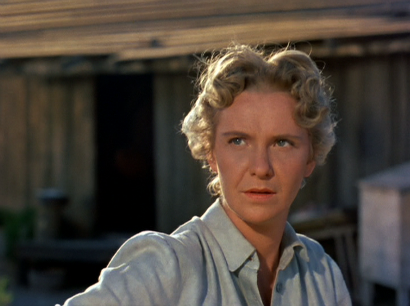 A self-described "plain" woman accustomed to fending for herself, Page's Lowe is uncertain what to make of the rangy stranger ambling her way. Turns out, the stranger is Hondo (John Wayne in the kind of performance for which celebrity impressionists exist), a man the isolated woman will come to know well over the next 80 or so minutes.
A self-described "plain" woman accustomed to fending for herself, Page's Lowe is uncertain what to make of the rangy stranger ambling her way. Turns out, the stranger is Hondo (John Wayne in the kind of performance for which celebrity impressionists exist), a man the isolated woman will come to know well over the next 80 or so minutes.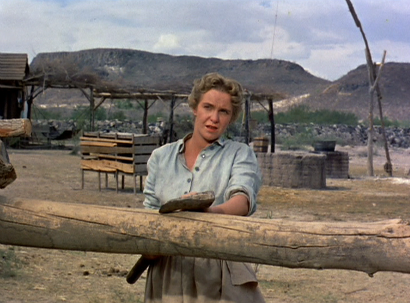 Page's Angie agrees to let Hondo use a horse that's not yet trained and, as Hondo "breaks" the animal, she assesses the man with a wary but avid delight.
Page's Angie agrees to let Hondo use a horse that's not yet trained and, as Hondo "breaks" the animal, she assesses the man with a wary but avid delight.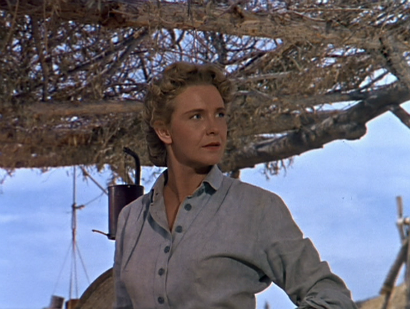 In these early scenes, Page's Angie is constantly announcing the fact of her husband, who -- she repeatedly says -- will be back any minute, or any day, or any week now. Page's handling of Angie's conspicuous fibs is uncomplicated, allowing just the whiff of untruth to linger in the air as the character continues to do or say whatever else she needs to.
In these early scenes, Page's Angie is constantly announcing the fact of her husband, who -- she repeatedly says -- will be back any minute, or any day, or any week now. Page's handling of Angie's conspicuous fibs is uncomplicated, allowing just the whiff of untruth to linger in the air as the character continues to do or say whatever else she needs to.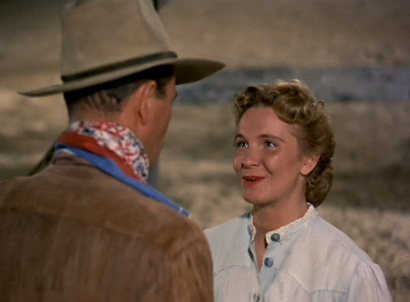 Yet, as Page's Angie becomes better acquainted with Hondo, she becomes ever more smitten with the confident, competent cowboy. Here, too, Page registers Angie's shift in emotional attention in the simplest terms. Angie's mounting interest in Hondo's is marked by Page's increasingly shy smiles, and these lingering, intent looks are some of the only evidence of this grown woman's amplifying crush on Wayne's Hondo.
Yet, as Page's Angie becomes better acquainted with Hondo, she becomes ever more smitten with the confident, competent cowboy. Here, too, Page registers Angie's shift in emotional attention in the simplest terms. Angie's mounting interest in Hondo's is marked by Page's increasingly shy smiles, and these lingering, intent looks are some of the only evidence of this grown woman's amplifying crush on Wayne's Hondo.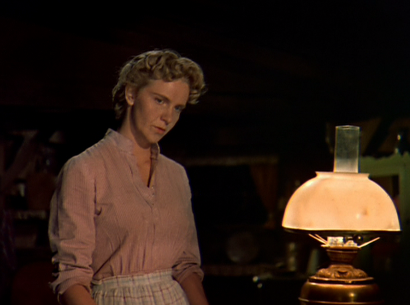 Page's work in the role of Angie is rife with gestures of comparably uncomplicated clarity. Page's Angie likes Hondo, enjoys having him around, trusts him with her land and her son -- but she's also careful not to get her hopes up that the pleasure will last. After all, she is married and her husband will be back any whatever now...
Page's work in the role of Angie is rife with gestures of comparably uncomplicated clarity. Page's Angie likes Hondo, enjoys having him around, trusts him with her land and her son -- but she's also careful not to get her hopes up that the pleasure will last. After all, she is married and her husband will be back any whatever now...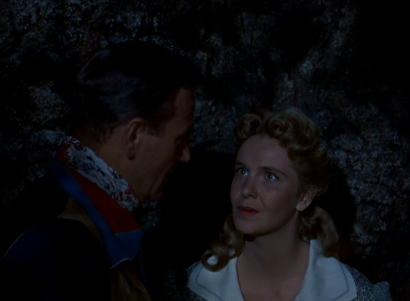 At about midpoint in the film, as Hondo leaves Angie alone on the homestead, several questions emerge: will Angie and her son be safe amidst the Apache uprisings? will Hondo find out the truth about Angie's husband? and, perhaps most essentially (as this film is an utterly conventional romance, albeit with black-limbed "Injuns" as the main obstacle), will Hondo and Angie ever be able to get together?
At about midpoint in the film, as Hondo leaves Angie alone on the homestead, several questions emerge: will Angie and her son be safe amidst the Apache uprisings? will Hondo find out the truth about Angie's husband? and, perhaps most essentially (as this film is an utterly conventional romance, albeit with black-limbed "Injuns" as the main obstacle), will Hondo and Angie ever be able to get together?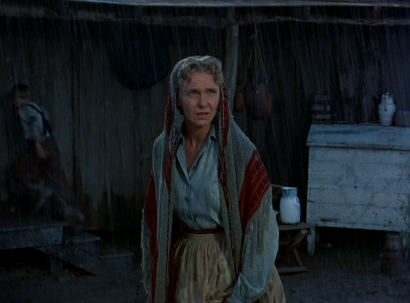 The resolutions of these boilerplate dilemmas are, in and of themselves, less than interesting, which perhaps why I so admire Page's unpretentious yet complex rendering of Angie.
The resolutions of these boilerplate dilemmas are, in and of themselves, less than interesting, which perhaps why I so admire Page's unpretentious yet complex rendering of Angie.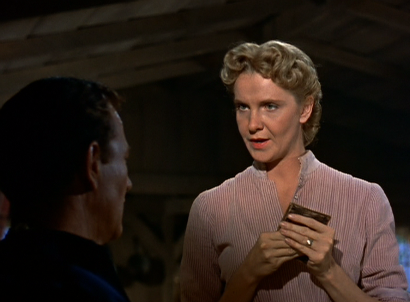 Page invests Angie with a subtle depth and dimension that is both haunting and humane. In her hands, Angie becomes an articulated human instead of merely a type. Note, for example, how Page's Angie registers the news of the circumstance of her husband's death. With a measured, contemplative turn, she says, "Ed wasn't the type to die well." Page holds this moment simply, allowing Angie a kind of sadness while also crafting a kind of mystery with her reaction, a mystery that permits the possibility of something unspoken mattering as much or more than that which is said. (Indeed, Page maneuvers the dimensions of subtext with such artful, uncomplicated ease in this role that it's hard to reconcile her work in Hondo with the self-consciously neurotic frippery that would mark most of her more celebrated performances.)
Page invests Angie with a subtle depth and dimension that is both haunting and humane. In her hands, Angie becomes an articulated human instead of merely a type. Note, for example, how Page's Angie registers the news of the circumstance of her husband's death. With a measured, contemplative turn, she says, "Ed wasn't the type to die well." Page holds this moment simply, allowing Angie a kind of sadness while also crafting a kind of mystery with her reaction, a mystery that permits the possibility of something unspoken mattering as much or more than that which is said. (Indeed, Page maneuvers the dimensions of subtext with such artful, uncomplicated ease in this role that it's hard to reconcile her work in Hondo with the self-consciously neurotic frippery that would mark most of her more celebrated performances.)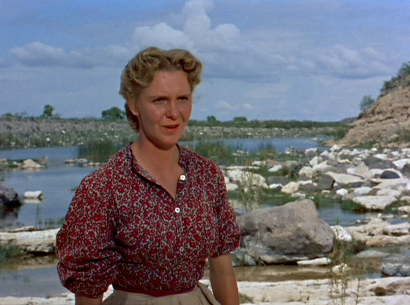 In this cardboard cutout of a character, Page delivers what is easily my favorite among her many accomplished performances. Solid, subtle and empathetic, Page's Angie elevates this generic puddle of a film with a humane integrity that is by turns surprising and surprisingly effective. And while this performance/nomination might legitimately be accused of "category fraud," it might just as well be a case of an actress sneaking from the edges to steal center stage.
In this cardboard cutout of a character, Page delivers what is easily my favorite among her many accomplished performances. Solid, subtle and empathetic, Page's Angie elevates this generic puddle of a film with a humane integrity that is by turns surprising and surprisingly effective. And while this performance/nomination might legitimately be accused of "category fraud," it might just as well be a case of an actress sneaking from the edges to steal center stage.



3 comments:
Once again, I've enjoyed your Smackdown. I'm sorry to learn you don't share my admiration for Ms. Page; but am glad you enjoyed this performance.
While there is no denial many of her later work contains "neurotic frippery"; she also manages to convey the sub-text as well.
Anyway, I chose 1953 because Hondo is one of her performances I have not seen. I couldn't be happier with the outcome (though I enjoy Ritter's performance a great deal).
Seriously. What a performance this is. I'm glad if Reed wasn't loved that Page took her place.
The more I think about Pickup on South Street, the more it feels like Ritter just phoning it in. Page in Hondo has so much more depth.
My Ritter profile should be up soon but my basic take on it now, with the benefit of reflection, is that the final scene is transcendent but all that precedes it is rote. More soon...
(I hate that I have no internet at home; complicates my life immeasurably.)
Post a Comment